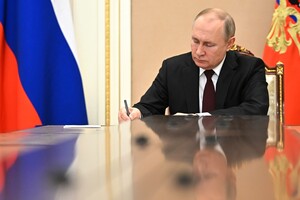Since the Cold War, leaders have not allowed themselves to threaten others with nuclear weapons, but gin has already been released from the bottle, and it is time for Washington to prepare a response.

Vladimir Putin's readiness to resort to nuclear threats, from a certain point of view, can be regarded as a good sign. After all, this means that Russia is likely to lose the war against Ukraine. But the threats could also be potentially catastrophic. The Financial Times reported, adding that if Putin's goal was to intimidate the West, then he failed. NATO continues to supply weapons to Ukraine. The question is what he will do if he realizes that Russia's defeat in the war is inevitable. Putin continues to hint that he knows the exact answer. Anyway, the gin has already been released from the bottle.
Putin has broken the taboo on nuclear threats following the Caribbean crisis. This fact alone shows that the world is now in unexplored territory.
“Most people do not know this, but the world has entered the most dangerous period since 1962, when the Caribbean crisis. Most of those under the age of 50 grew up thinking that the nuclear ghost was a relic of the last century. In the last few weeks, the prospect of exchanging nuclear strikes has become the greatest threat to peace in this century, “the article reads.
Read also: Russia's nuclear blackmail: what Putin is ready for and what Ukraine needs to know
As for public awareness, the debate over Putin's rhetoric has been a good example of a situation where “those who know are silent and those who do not know speak.” It's easy to dismiss Putin as a poker fan who bluffs and tries to get out of a bad bet. In the end, he has to “reset” the cards. But US civilian and military officials do not suffer from such naivety. Many of them took part in military exercises involving the use of limited tactical nuclear weapons, which do not grow into an exchange of strikes with the help of strategic arsenals. The latter would be the end of the world.
If there is a 5% chance that Putin will detonate nuclear weapons on the battlefield, the world will be in greater danger than ever in the lives of most people on the planet. In the last few days, Moscow's statements have increased the chances to one in ten. Putin said the Sarmat ballistic intercontinental ballistic missile test was a reason for the West to “think.” Such words would be appropriate except for Ernst Stavro Blofeld – a super-villain from the James Bond films of the 20th century. On Wednesday, Putin said: “We have all the tools to respond to the existential threat to Russia that no one else can boast of. And we will use them if we have to. “
The natural reaction was that President Joe Biden and his European counterparts made it clear that NATO would not fight in Ukraine. In other words, the West does not pose an “existential threat” to Russia that would justify the use of nuclear weapons. But this is how the West sees the situation. The threats by Putin and his officials came amid allegations that Russia was already at war with NATO. Russians are told every day that they are fighting for the survival of their people against the “Nazis” who are supported by the West.
Such rhetoric surpasses anything that sounded during the Cold War. The concept of guaranteed mutual annihilation, which emerged after 1962, provided that each party must clearly know what the opponent is doing and thinking. But over the past decade, most channels of information exchange have been disrupted. Putin has closed all Cold War protocols and even accused Russian nuclear physicists of spying on US counterparts. This means that enemies, who own 90% of the world's nuclear warheads, do not know more about each other than they did in the 1970s or 1980s. In this situation, ignorance is not a blessing.
Read also: Johnson believes that Putin will not resort to the use of tactical nuclear weapons in Ukraine
The acute question is how Biden will answer, if Putin blows up a tactical nuclear munition in Ukraine. He has several options. It is possible to strike a non-nuclear strike at the place where the Russian missile originates: at a factory or, for example, a launch pad. Another way to respond is to impose a full trade embargo and accompanying sanctions on those who refuse to comply, including China. The first option, ie a strike on Russian territory, is the risk of provoking a dangerous escalation that could spiral out of control. And the second would not be enough. There are also intermediate steps between the two options, such as strikes on Russian ships or a powerful cyber attack. In any case, one can only guess how Putin will respond. No one knows what scenarios are being developed in the White House, let alone the Kremlin. However, there is nothing more important for our destiny now.




